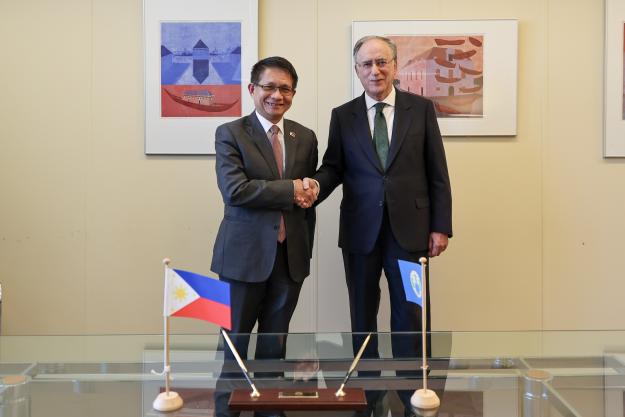
H.E. Mr. Jose Eduardo Malaya, Permanent Representative of the Republic of the Philippines to the OPCW, and Ambassador Fernando Arias, OPCW Director-General, during a ceremony to formalise the Philippines’ contribution to the Trust Fund for the Scientific Advisory Board in the total amount of EUR 10,000. The ceremony took place at OPCW Headquarters in The Hague, the Netherlands
THE HAGUE, Netherlands—4 April 2025—The Government of the Philippines contributed €10,000 to the Trust Fund for the Scientific Advisory Board (SAB) of the Organisation for the Prohibition of Chemical Weapons (OPCW). The contribution will be used to support the activities of the SAB and its Temporary Working Groups.
The voluntary contribution was formalised on 1 April 2025 in a signing ceremony held between the Ambassador, Permanent Representative of the Philippines to the OPCW, H.E. Mr Jose Eduardo Malaya, and the OPCW Director-General, Ambassador Fernando Arias, on the sidelines of the 39th session of the SAB at the OPCW’s Headquarters in The Hague.
“This voluntary contribution demonstrates the Philippines’ commitment to ensuring that the OPCW gets the best scientific and technological advice, through the Scientific Advisory Board, which is crucial for the effective implementation of the Chemical Weapons Convention (CWC). It underscores the importance of science and technology in safeguarding mankind from the scourge of weapons of mass destruction, notably chemical weapons, and in enabling people in harnessing the peaceful uses of chemistry,” said Ambassador Malaya.

H.E. Mr. Jose Eduardo Malaya, Permanent Representative of the Republic of the Philippines to the OPCW, and Ambassador Fernando Arias, OPCW Director-General, during a ceremony to formalise the Philippines’ contribution to the Trust Fund for the Scientific Advisory Board in the total amount of EUR 10,000. The ceremony took place at OPCW Headquarters in The Hague, the Netherlands
“I wish to thank the Philippines for this contribution, which will support the ongoing work of the SAB. Monitoring rapid advancements in science and technology is of critical importance to the work of the Organisation and its mission to permanently eliminate chemical weapons,” said Director-General Arias. “This is especially important in the context of emerging technologies, such as AI, which could present both threats and opportunities in relation to the implementation of the Chemical Weapons Convention.”
Background
The Philippines has been an active member of the OPCW since the Chemical Weapons Convention entered into force in 1997. In the OPCW Subsidiary Bodies, the Philippines is represented on the Scientific Advisory Board by Dr Imee Su Martinez, who serves as Chairperson of the SAB. The Philippines also serves as regional coordinator for Asia.
The Scientific Advisory Board (SAB) is an OPCW subsidiary body that enables the Director-General to render specialised advice in science and technology to the Conference of the States Parties, Executive Council, or States Parties to the Convention.
The SAB reports to the Director-General, who submits its reports, alongside his own response, to the Executive Council. Every five years, the SAB prepares a larger report on developments in science and technology for submission to Review Conferences of the Chemical Weapons Convention.
Currently, the SAB has two Temporary Working Groups (TWGs): one on chemical forensics and one on Artificial Intelligence (AI). The TWG on Chemical Forensics is reviewing the science and technology relevant to chemical forensics to identify remaining gaps and challenges for the OPCW and analytical labs. The TWG on AI is investigating the impact of AI technologies on the object and purpose of the Convention, to identify the risks to and opportunities for its implementation.
To date, in total, the Philippines has donated EUR 12,795 to OPCW trust funds. The amount was allocated to the Trust Fund for a Centre for Chemistry and Technology.
As the implementing body for the Chemical Weapons Convention, the OPCW, with its 193 Member States, oversees the global endeavour to permanently eliminate chemical weapons. Since the Convention’s entry into force in 1997, it is the most successful disarmament treaty eliminating an entire class of weapons of mass destruction.
In 2023, the OPCW verified that all chemical weapons stockpiles declared by the 193 States Parties to the Chemical Weapons Convention since 1997 — totalling 72,304 metric tonnes of chemical agents — have been irreversibly destroyed under the OPCW’s strict verification regime.
For its extensive efforts in eliminating chemical weapons, the OPCW received the 2013 Nobel Peace Prize.
